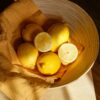It’s a new year and you are full of hope. This is the year you will claim or reclaim your good health! If you have a little feeling of dread in the back of your mind because this same scenario happens every year, have no fear. Big changes are often daunting and hard to fold into your everyday life; they are simply not sustainable. Try a new healthy habit a week. These are small changes that can make a big impact on not only your health, but the environment’s health as well. Tape these easy tips to your refrigerator and read weekly. Feel free to skip ahead and to go back.

1. Listen to what your body is trying to tell you. Bloated? What did you eat or drink? Crave wine in the afternoon. Are you hungry? Listen carefully when something is amiss.
2. Drink 8 glasses of pure water a day.
3. Limit your caffeine intake: 1-2 cups of coffee a day.
4. Plan your weekly meals on your day off.
5. Spend 30 minutes twice a week preparing fresh veggies to have them ready at all times.
6. Keep seasonal fruit at home and eat it when you’re hungry or when a sweet tooth strikes.
7. Substitute raw nuts and seeds for processed granola bars.
8. Don’t drink alcohol on an empty stomach; it’s hard on your stomach and burns up B vitamins.
9. Eat raw vegetables every day. Raw veggies contain important enzymes that can be lost when they’re cooked.
10. Purchase as much of your food organic as you can. Your body will appreciate it as will our planet.
11. Next time you make cookies or cake, substitute half of the butter (not that I have a problem with butter) with applesauce, pumpkin or prune puree. More nutrients and dietary fiber.
12. Get at least 8 hours of sleep a night. Practice good sleep hygiene: screens off a couple hours before bed, watch the alcohol and caffeine in the afternoons and sleep in a dark room.
13. Vary your food; if you eat it today, don’t eat it for 4 days.
14. Different colored food has different nutrients, so eat from the rainbow. Red peppers, orange carrots, green kale, etc.
15. Thicken soups with pureed beans. Delicious and added nutrition.
16. Don’t drink water from plastic bottles. Polycarbonate water bottles (labeled #7) contain bisphenol A (BPA), which leaches from the plastic and has been linked to chromosome damage and hormone disruption.
17. Start your day with a glass of fresh lemon water. 1/2 to 1 juiced lemon in water. Your liver loves it. Rinse your mouth afterwards, so lemon juice doesn’t weaken your teeth.
18. De-stress. Find out what works for you. Warm baths? Exercise? Reading? Yoga? Walks in the woods? Find out what calms and soothes you and practice daily.
19. Move daily. Find the movement that moves your body and eases your mind and make it a part of who you are. If you enjoy it, you will do it.
20. Eat at a table; cloth napkin on your lap and chew well. Be thankful.
21. Next time you want scrambled eggs (or tofu), sauté some veggies first, then add eggs. Try eating your veggies all day!
22. Dry brush your skin before you shower in the morning. It’s good for your lymphatic system and your skin will be so much softer and healthier.
23. Have at least one day a week without meat. Meatless Monday perhaps.
24. Eat more beans! They’re high in protein, dietary fiber, and taste so good.
25. Use whole grain flour in your baking instead of white flour. Whole-wheat pastry flour is a fine grind and much healthier than the white stuff.
26. Remove white sugar from your diet or at least limit it. Use maple syrup, honey, coconut sugar or stevia instead.
27. Don’t eat fake food! No artificial anything!
28. Don’t eat out as much. Cook more.
29. Exercise your mind! Learn a new dance, read a good book. Learn a new language. Keep your mind moving as well as your body.
30. Learn to communicate better. Speak your mind, kindly, and be done with it. Don’t hold grudges. Forgive yourself and others.
31. Make your own vinaigrette for your salads. Olive and/or flax oil, lemon juice or vinegar, a little Dijon mustard, a minced garlic clove and a little salt and pepper.
32. Use sea salt instead of the highly processed salt you find in many grocery stores.
33. Reduce salt intake if your intake is above 2,300 mg/day. Use fresh herbs and lemon juice to boost flavor.
34. Try to stay off computers and away from anything electronic two hours before bed for a better night’s sleep.
35. Eat more fermented foods! Raw sauerkraut, kimchee, keifer. Use plain yogurt instead of sour cream, add a little sauerkraut to your next tuna salad, etc.
36. Switch to whole wheat, corn or quinoa pasta (there are many selections) instead of pasta that uses refined flour. The ancient wheat einkorn is lovely.
37. Don’t eat or drink any food with trans-fat. Watch those non-dairy creamers!
38. Add more leafy greens to your life-kale, chard, spinach, radicchio, etc. They are wonder foods! Steam the greens for a couple minutes, drain and set aside. In a pan sauté some onions, garlic and shitake mushrooms in olive oil for a few minutes. Add the kale back in, stir and serve. Yum.
39. Use less cheese in casseroles that call for cheese. Instead sprinkle grated cheese on top.
40. Begin each day with a good stretch and some deep breaths.
41. Try new ingredients. Buy a kohlrabi or something you’ve never tried before and go from there. Keep yourself inspired.
42. Don’t reward yourself or your family with food.
43. Try to eat whatever food is in season; it’s more nutritious and tastes better.
44. Don’t go hungry. Eat healthy snacks so you don’t overeat later. That said, some intermittent fasting (don’t eat for about 16 hours) is thought to be health-supporting, and something our ancient ancestors did as a matter of course.
45. Watch what you put on your skin. Many products are loaded with chemicals that you shouldn’t rub into your skin.
46. Bake instead of frying your meats and fish.
47. Increase Omega 3 fatty acids in your diet. Sources include walnuts, flax seeds and oil and cold water fish such as salmon. Healthy fats are important to good health. Also, reduce your omega 6 fatty acids. The ration between the two should be no more than 4:1 omega 6 to omega 3.
48. Increase your intake of legumes: lentil, beans and peas. They are good sources of protein, dietary fiber and blood sugar regulators. Try split pea or lentil soup for breakfast! Think outside the box. Legumes are also great blood-sugar regulators, so try 1 cup of split pea soup for breakfast!
49. Consider taking supplements to fill in your nutritional gaps. Speak with your health practitioner.
50. Watch your portion sizes as well as your plate and utensil sizes. Some forks and spoons look like garden utensils. Try chopsticks and eat slowly.
51. Shop in the outside aisles of the grocery store. Most of the more processed foods are located in the middle isles.
52. Play! Everyone needs to have fun!















